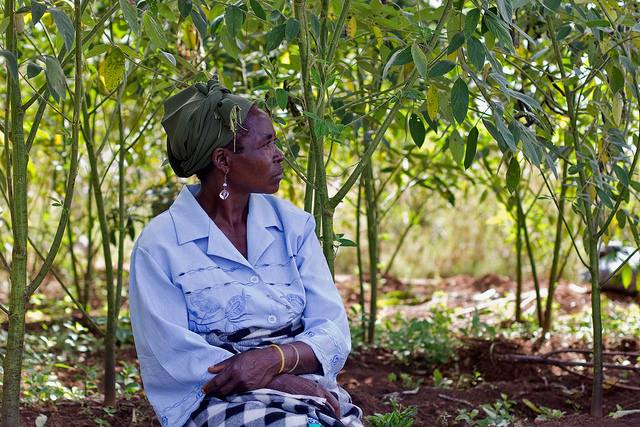The EITI standard is an immensely powerful tool. We can make it even more powerful – and inclusive – by making it reflect the experiences of women. All the evidence points to several important and necessary changes, which the EITI cannot afford to ignore any longer.
Members of the PWYP movement all strive for the interests of communities who are left out of vital decisions by oil, gas and mining industries. These industries might be actively threatening their way of life – think of the obvious environmental destruction of an open-cast mining quarry, for example. In other cases, these industries may not be operating transparently, or giving their fair share back to the economies that host them. Communities suffer a deficit of schools, doctors and roads while billion-dollar revenues are accrued through the extractives industry.
Too often, it is women among them who suffer most, as influential reports, including this recent Oxfam report, have shown.
The EITI was created to establish a global standard of transparency that would allow civil society – and coalitions like ours – to make these industries more accountable to those very communities. But women are far less likely to have a voice at the EITI, while bearing an outsized share of the negative impacts from resource extraction.
On our website, we recently told the story of Mwabulambo, a village in Malawi which has suffered immensely from coal mining.
In Mwabulambo, like in many parts of the world, women conduct most of the domestic tasks. When collecting firewood suddenly takes twice as long, it is primarily a women’s problem. But women in Mwabulambo have no say in land issues, and the communities were not consulted in the first place. In other words, the abrupt arrival of industrial coal mining compounded their existing problems with patriarchy.
When the problems of Mwabulambo have the potential to be repeated in each of the 51 countries implementing the EITI, the nature of the challenge, and the potential for a global solution, emerges more clearly.
In 2018, PWYP initiated a pilot project in West Africa looking at gender and the EITI. Almost none of the EITI reports reviewed contained any references to gender, with only a few examples of gender disaggregation of data, but with no further analysis of its meaning.
In Guinea on the other hand, which joined the EITI in 2005 and has published 12 reports since then, gender was mentioned for the first time in 2016. The validation guide encouraged civil society and enterprises to consider diversity in its representation, including on the basis of gender. While this goes in the right direction, references to gender are still quite vague, which illustrates how gender dimensions have not been a priority in the past.
So, what can the EITI do?
Of course, it cannot solve all problems of gender inequality. But as a key means for extractive transparency, it must do more to allow women in.
The first order of business is to ensure the data and reports produced reflect the reality of the extractives sector on the ground, in particular on employment based on gender and the gender responsiveness of budgets. Another related and immediate priority relates to the country-level ‘multi-stakeholder groups’ (MSG) prescribed by the EITI process in any country. The questions should be: who participates, who decides what type of information is disclosed, and how and with whom is that data shared? Is that information relevant for women?
The MSG is the main forum where a country’s government, business and civil society meet to advance their transparency commitments. At present, the majority of national MSGs have fewer than 25% women participation1. Several have no women at all. As a fundamental first step, each stakeholder group should consider gender balance in their representation.
As companies are now starting to embrace gender inclusion and responsiveness, it is time for the world’s leading transparency initiative to catch up – and lead on gender as well. Rio Tinto, for example, published a gender equity guide informing its work with communities. Companies that are publicly-listed in the UK – including BP, Shell and Tullow Oil – have all published pay gap analyses for the past two years.
Furthermore, key information needs to be made available to all stakeholders, and women in particular, through improvement of the existing EITI country data dissemination plans.
These initial changes are not difficult to make.
The benefit of transparency is what you learn from the information disclosed. This helps improve decisions – but it should also help improve the transparency we seek, and who participates in the decisions. If the EITI keeps women invisible – despite the growing clamour from civil society voices around the world – it will be disavowing its own vision and standards.
1 Source: MSI report, Protecting the Cornerstone: Assessing the Governance of Extractive Industries Transparency Initiative Multi-Stakeholder Groups, February 2015











